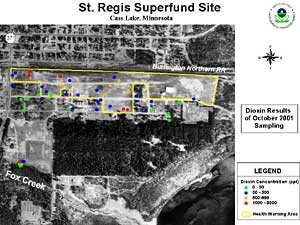|
Audio
Photos
Resources
Your Voice
|
EPA proposes more soil testing at Superfund site in Cass Lake
April 10, 2003
The U.S. Environmental Protection Agency wants to do more soil testing at a Superfund site in northern Minnesota. The former St. Regis wood treatment plant operated on the Leech Lake Indian Reservation. For 30 years the plant, near downtown Cass Lake, polluted the soil and water with dioxin, a chemical that causes cancer. The EPA began cleaning up the site in 1984. Federal officials say it's still not clean, and city and tribal leaders are frustrated with the speed of the clean-up.
Cass Lake, Minn. — Elaine Fleming grew up near the St. Regis wood treatment plant on the south side of Cass Lake. She drank from a neighborhood well. She waded with other children in ponds nearby. She played on pile of logs soaked with chemicals now known to cause cancer and birth defects.
"My brother died -- he died of cancer. He had three different kinds of cancer," said Fleming. "My sister died of lupus, which is an auto-immune type of disease. I have a thyroid disease. And other people talk about their problems. They're really concerned." Fleming is now mayor of Cass Lake. Her election last fall was historic. She's the first female mayor of the town and the first Native American mayor. Fleming is also the first Green Party mayor in Minnesota, though she says her candidacy wasn't about party politics.
Fleming says the Superfund problem has consumed her life. And she's vocal about it. She says some city leaders are worried the bad publicity will hurt the town.
 | |||
"A lot of people want to be quiet about it," she said. "I just want the people to know what they're living in. It's contaminated. It's phenomenal what's going on here."
Fleming says the community was led to believe the site was mostly cleaned up years ago by the federal government. But in 2001, the Environmental Protection Agency conducted a five-year review of the site. They found high concentrations of dioxin in the soil. Tissue samples of whitefish in Cass Lake and Pike Bay contained dioxin levels 10 times higher than those from other nearby lakes.
The EPA recently released a document proposing more soil samples. The EPA's Tim Drexler says this round of testing will show whether the soil still poses a risk.
"We are really hoping that this round is very definitive in terms of -- is there, is there not. So that we can, with the tribe, with the state, and with the responsible parties, address this the way that needs to be addressed," said Drexler.
One likely possibility is to dig up a layer of topsoil. Another option is to put a fence around the contaminated area. EPA officials say it's too soon to tell which option might be chosen.
|
It's a long, drawn-out process, and people get frustrated with it. But I think it's a dinosaur. It's government, federal government. And I don't know that we can make it move any faster.
- Shirley Nordrum |
The EPA is still in negotiations with the Leech Lake Band of Ojibwe on the level of cleanup. Tribal officials say the federal government's acceptable level of dioxin concentration is too high. Gerald White, the tribe's executive director, says the contamination poses a bigger threat to Indians.
"The potential for contaminant uptake in our systems is much greater, and that magnifies the impact on us, on Native people, because of the way we live -- the subsistence lifestyle. And it's not considered by the EPA properly," said White.
The tribe wants the federal government to conduct a comprehensive health study of the community. Area doctors claim there are high rates of cancer and immune diseases. Leech Lake Environmental director Shirley Nordrum has been working on the problem for a dozen years. She's frustrated, but optimistic.
"I know that it's going slow," Nordrum said. "It's a long, drawn-out process, and people get frustrated with it. But I think it's a dinosaur. It's government, federal government. And I don't know that we can make it move any faster."
Federal officials say they won't do any health study until the contamination is cleaned up. The EPA could begin soil testing in Cass Lake as early as June. If necessary, soil removal could happen this year. But one federal official said it could take up to two years to review all the data and determine the extent of the health risk to the people.
|
News Headlines
|
Related Subjects
|

